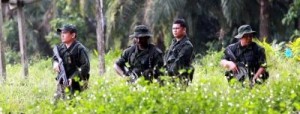PH calls for peaceful solution to Borneo standoff

Malaysian forces are patrolling Kampung Tanduo where about 200 Filipinos are in a tense standoff with Malaysian security forces. The Star-Asia News Network
LAHAD DATU, Malaysia—The Philippines on Saturday called for a peaceful resolution to a tense standoff between Malaysian forces and a group of gunmen claiming to be followers of the heir of a former sultan of Sulu and North Borneo.
A Sulu sultan has been called in to resolve the standoff, reports coming from Malaysia said on Saturday.
Sultan Jamalul Kiram III, a descendant of the Sulu sultanate and a relative of the armed group leader, Rajah Mudah Agbimuddin Kiram, is expected to help find a peaceful solution to the standoff that entered a fifth day on Saturday.
But Jamalul is in Manila, refusing to retract a “royal decree” that he issued last November for the heirs of the Sulu sultanate to return to Sabah.
The group, estimated at 300 with dozens believed to be armed, landed by boat near the Borneo town of Lahad Datu in Malaysia’s Sabah state from the neighboring Simunul Island in the Philippine province of Tawi-Tawi on Tuesday.
Article continues after this advertisementMalaysian police say the group has declared itself followers of a former Philippine-based Islamic sultanate that once controlled parts of Borneo, including the standoff site, and is refusing to leave Malaysian territory.
Article continues after this advertisementPresident Aquino’s deputy spokesperson, Abigail Valte, said in Manila on Saturday the safety of the Filipinos was the government’s main concern, as Malaysian armed forces and police have locked down the area.
“The primary concern now is their safety and to resolve the incident peacefully,” Valte said in an interview on state-run radio.
She said the Philippines had received assurance from Malaysia that the government would encourage the group, which Manila has yet to identify, to leave the area peacefully.
Negotiations
Sabah police chief Hamza Taib was quoted by local dailies as saying police were in negotiations with the group and expected the standoff to be resolved “very soon, with the group returning to their home country.”
Agbimuddin has been negotiating with Malaysian emissaries since Tuesday.
He is said to have been an assistant district officer of Kudat during the time of former chief minister Mustapha Harun, between 1967 and 1976.
Agbimuddin has met with another relative of the Sulu sultan, who was brought in from Kuala Lumpur.
Agbimuddin’s group has refused to leave the village of Tanduao in Lahad Datu, saying they should not be expelled because Sabah is part of the Sultanate of Sulu and North Borneo.
Speaking in English, Agbimuddin showed Malaysian emissaries documents of the ancestral claim to Sabah.
The emissaries are hoping for the group to give up their demand to be given back their ancestral land.
Blockade
Malaysian police have set up a series of roadblocks along the route leading from Lahad Datu through palm oil plantations to the remote Tanduao village, where the gunmen are. Marine police were also patrolling the sea.
An Agence France-Presse photographer was denied access some 20 kilometers from the standoff site.
Agbimuddin’s group—comprising of Tausugs and Badjaos from Basilan, Jolo and Tawi-Tawi—had grown in number since they arrived in boats on Saturday.
From a reported 100 earlier this week, they are now 300, mostly aged from 20 to 60, dressed in black and gray military fatigues and armed with M16 rifles, M14 grenade launchers and .45-cal. 1911 pistols.
They have set up at least six camps in Tanduao.
To prevent the group from increasing, security agencies have blocked off entry from the southern Philippines, whose closest islands are Sitangkay and Sibutu, which can be reached by boat within 15 minutes.
Sabah leased for P77K
Police Commissioner Taib said the police had contingency plans in the event the talks break down.
The Sulu sultanate was a regional power center until its demise a century ago. The Malaysian government leases Sabah for 5,300 ringgit (P77,000) a year under a longstanding agreement with the heirs of the sultanate.
A Philippine military official, who spoke on condition of anonymity, told the Agence France-Presse on Friday the group was demanding an increase in the nominal amount Malaysia pays.
Sabah has a history of incursions by armed Philippine groups and the prickly situation could test ties between the neighbors, who are fellow members of the Association of Southeast Asian Nations.
In the worst incident, guerrillas of the Islamic militant Abu Sayyaf movement seized 21 mostly Western tourists at the Sabah scuba diving resort of Sipadan in 2000. They were taken to Basilan and later ransomed. Reports from AFP and The Star/Asia News Network